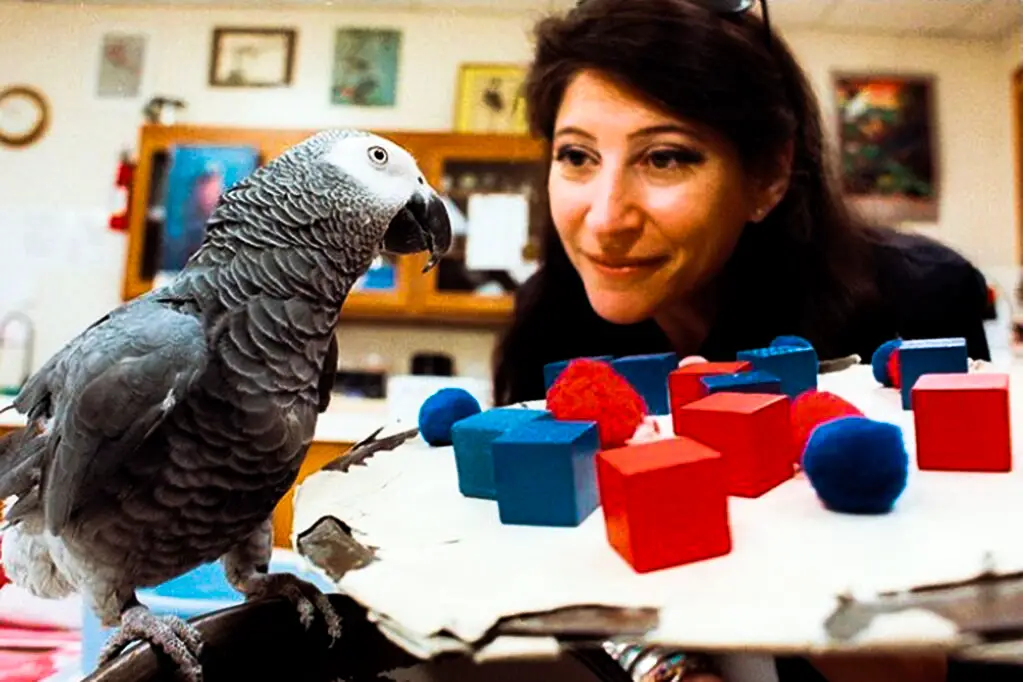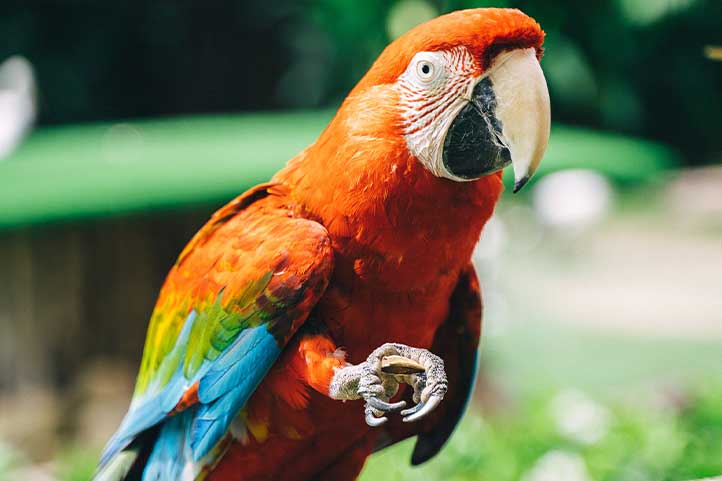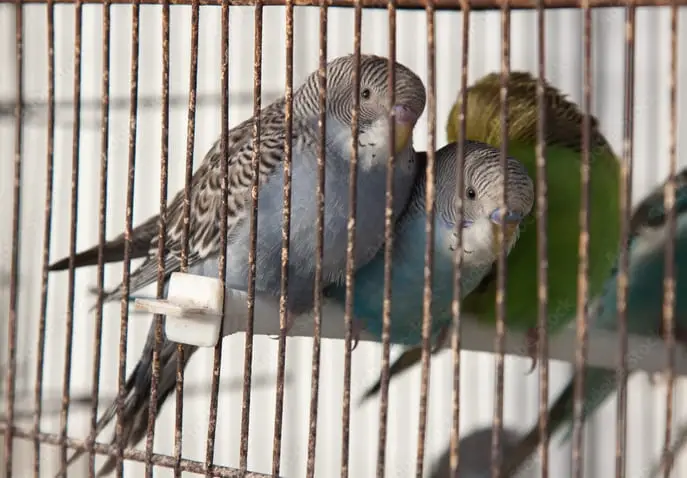Translated by Nick R
For centuries, birds have been regarded as exuberant and beautiful animals, so much admired that we decided to domesticate them and adapt them to our lives. Studies have highlighted their intelligence, but do you know which are the most intelligent domestic birds?
Table of Contents
Why are birds intelligent animals?
Despite what many people think, some species of birds have proven to be as intelligent as a 5-year-old child, according to some studies, which is why they have become much more attractive to us humans, either to keep them in our homes or to continue learning about them through scientific research.
Birds possess a great ability to memorize and talk, one related to the other. The most talkative birds talk thanks to several factors, among them, the three most important are:
- Morphological (physical).
- Physiological (organic functions).
- Ethological (behavior).
How do these factors favor the intelligence of birds?
Birds are intelligent because…
They evolved to be intelligent
Birds are very intelligent animals because they possess two morphologically very important organs for learning and language. The most intelligent species possess the ability to sing and learn to speak, something that was thought to be only a human characteristic. But no, birds can also speak, with a large number of words.
Morphologically, two very important organs are involved in the learning and language process:
Syrinx
The syrinx is the main vocal organ, exclusive to birds, which allows our winged friends to speak and emit different sounds without the need of vocal cords. The syrinx is located below the trachea, which they use as an instrument that produces sounds through vibrations when air passes through the trachea. Additionally, this organ allows songbirds to emit two different sounds at the same time.
Tongue
The tongue is not directly involved in the cognitive and communicative abilities of birds, but it is an organ that facilitates the articulation of sounds and words. Oral language is a characteristic that nature has reserved for a few species, including humans. However, the tongue of the most talkative birds is special, because it is thick and very mobile, which favors their diction.
“The big little brain of birds”
Birds are very intelligent because anatomically they have been favored with a small and powerful brain with functions that allow them to learn fast and solve problems, as well as talk. This has to do with the fact that birds have an excellent memory and are able to “discern” when solving problems, obstacles, or making choices.
According to studies led by Vanderbilt University scientist Suzana Herculano-Houzel, the bird brain is the size of a walnut (macaws). Still, the number of neurons (nerve cells) is surprisingly larger than the macaque brain, which is the size of a lemon. Macaca is a genus of simiiform primates (they look like apes) with a certain level of intelligence and evolutionary closeness to human beings.
The study focused on the physiological processes of a specific part of the brain, called the pallium.
What is pallium?
This is an organ lodged in the encephalon (brain) of birds that have been considered the cerebral cortex of these animals and, as is the case in other species of animals (non-birds), this area of the encephalon is the seat that manages higher cognitive processes. That is intelligence beyond instincts. Scientists discovered that this area has a high density of nerve cells, double the number of primates.
Sociability is a trait of intelligence
Birds are intelligent because they are able to create complex social structures. If you review information on the different species of pet birds that exist, you’ll see that most of them are sociable. One example is birds of the Psittacidae family, or typical parrots, which establish flocks or smaller communities that, according to scientists, demonstrate a certain level of social complexity.
Other less intelligent animals organize themselves in groups. Why should this be an indicator of intelligence?
Yes, there are many other species of animals with less communicative and cognitive ability that organize themselves into social groups, for example, cows or oxen. But while this is true, in the case of birds, the true indicator of intelligence lies in their behavior and the way they communicate. The most intelligent birds establish community groups that help each other and communicate by means of specific codes, such as body language and vocal sounds.
Curious fact
Something interesting about bird behavior that is worth clarifying is that contrary to what was thought, these animals are able to articulate words, not only by imitating but by choosing words voluntarily when speaking. It is not unusual for some owners to engage their winged friends in conversation.
Why are birds so intelligent?
The smartest domestic birds
Now you have a clear idea of the main characteristics to consider to determine if a domestic bird is more intelligent than others. Keep in mind that by domestic birds or pet birds, I am referring to all the species that we can have at home, excluding any species that are illegally kept in captivity.
In that sense, let me show you the species of birds that, in my opinion, and taking into account the three factors that determine the level of intelligence of these animals, are the most intelligent.
Parrots are intelligent birds
Before continuing, bear in mind that here the word parrot is used in its strict sense, not as the group of species called parrots or parakeets (click for more information).
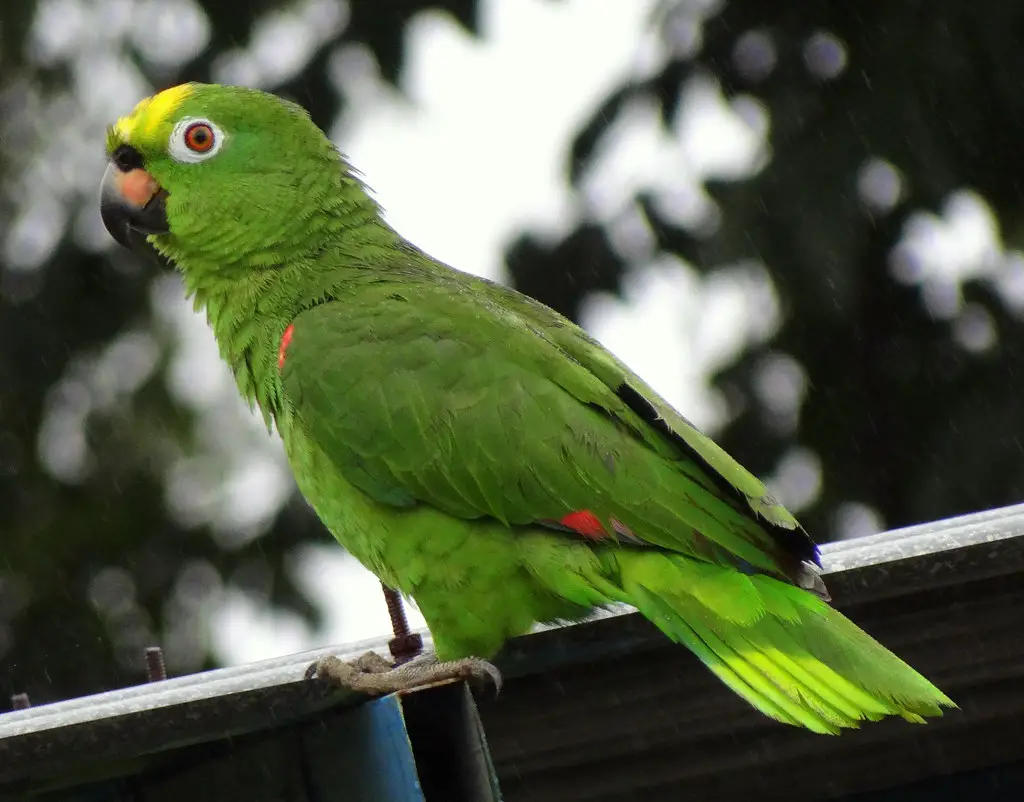
Amazon Parrot
The Amazon parrot or Amazona amazonica (Amazona amazonica) is the most common parrot species in homes, with a great intellectual capacity. Intellectual? Hmm, Intellectual… By intellectual, don’t think that it is a philosopher parrot or something like that (laughs). What I mean is that they are animals with communicative and cognitive abilities superior to many other animals. This is without a doubt, the most common parrot of all as a pet bird.
Morphology
Parrots have the two organs necessary for communication, the main skill for which these animals are admired. In particular, the parrot amazonica, as it is also known, is a parrot species known for its rapid adaptation to the environment, as well as its thick tongue and syrinx.
Physiology
Parrot brains functionally evolved in parallel with those of some mammals, including apes. Some experts have compared the intelligence of these birds to that of chimpanzees and humans. It sounds far-fetched, but it is not. Parrots have shown that they are able to learn from humans and their environment easily.
Parrots are genetically programmed to express complex attitudes as evidenced in their behavior in the wild and much more so as a pet with our training.
Ethology
They are noisy birds that remain in couples most of the time, although the species characteristically form groups or flocks of at least 50 individuals, which makes them a very sociable species. Sociability provides them with the ability to communicate and create community, either for foraging or grooming; revealing behaviors regarding their level of intelligence.
Macaws are brilliant birds
Among macaws, you’ll find two very common and highly intelligent species. In my opinion, they are the most brilliant on this list, without underestimating the rest of the species.
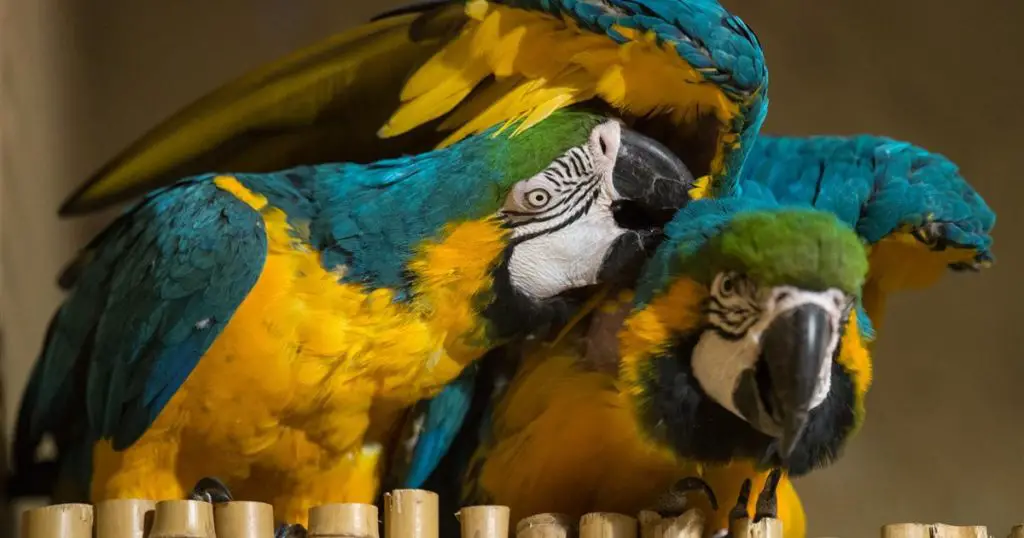
Blue-yellow macaw
The Ara ararauna or commonly known as macaw is one of the most common macaw species in the homes of bird lovers. It is loved mainly for its beautiful colors and behavior. In addition, it is a very appreciated animal in non-tropical countries such as Spain, for being an exotic bird (fortunately not endangered).
Morphology
One of the largest birds in the avian world and the second largest in the world of pet birds, reaching up to 90cm in length, with an equally robust beak and tongue, which allow them to articulate almost any word.
Physiology
The blue-and-yellow macaw has a brain with high neuronal density in the pallium sector, the area of the bird’s brain responsible for the most complex cognitive processes. In the case of this species of macaw, several studies have already been carried out showing the memorization of approximately 30 to 40 words by the specimen.
Etiology
Psittaciformes are generally very social animals and tend to form groups. But, the ararauna macaw is a unique species because it expresses emotions and its quality of life depends a lot on its “mood”.
That’s right, just as you read it; macaws like to be busy and receive affection and attention, otherwise, they could enter a state of permanent apathy. This level of emotionality is a far superior characteristic compared to other birds.
Macaws
Macaws, or Ara Macao, are very similar to the blue and yellow macaw, perhaps growing a little more, up to almost one meter in length. They have a red color on most of their body, with very bright and showy yellow, green, and blue spots on the wings. Probably the most appreciated specimen of this genus among pet bird lovers.
Morphology
“The Macao” is a macaw of a large size, possessing, as well as the ararauna, a pronounced curved beak with a downward facing upper jaw and a thick and fast tongue, with which it can articulate words with great ease.
Physiology
The brain of the Macao macaw is just as powerful as that of the ararauna macaw. The shorter connections between neurons in the pallium area are related to the intelligence of the birds and, in particular of this species, which understands any human language and is able to speak it. Also, with the ability to store memories.
Ethology
Like the Ara ararauna, the Ara Macao is a very social species that live in flocks, although it is usually seen in pairs (with the same one because they are monogamous). It is also a very emotional and spoiled species.
Cockatiels are very intelligent birds
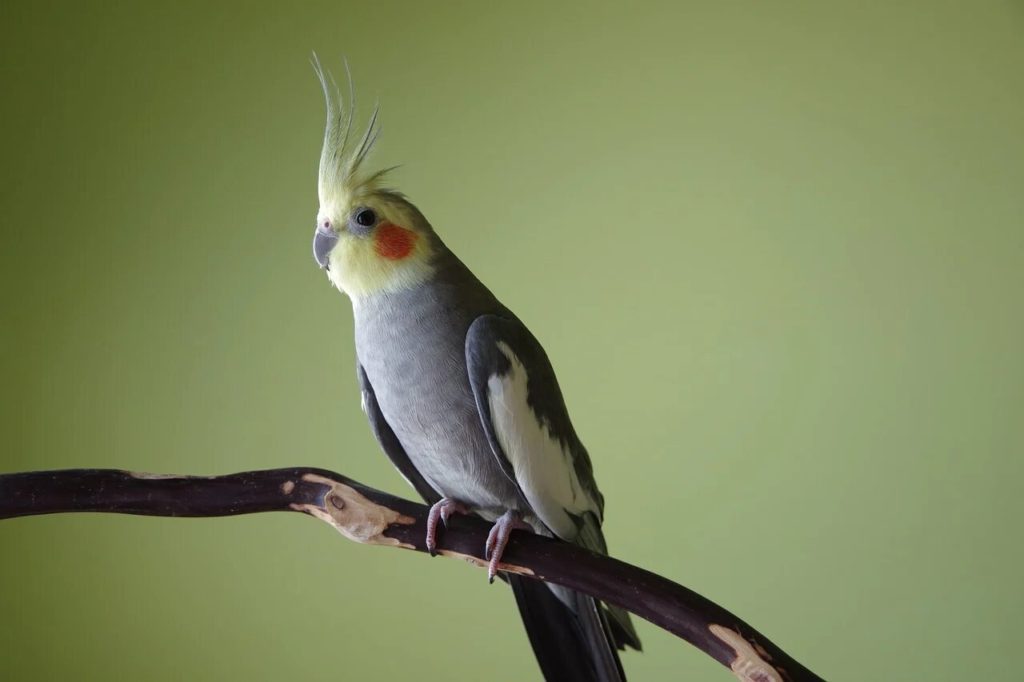
Cockatiel
The cockatiel (Nimphicus hollandicus) is one of the most loved pet birds; whether as owners or those aspiring to have their own winged friend, both fall in love with this species because of its intelligence and emotionality. The cockatiel’s ability to express emotions and communicate is impressive!
It is a bird that articulates words and emits sounds easily, not as easily as parrots and macaws. However, for a species that is not part of its direct evolutionary line of the Psittacidae, the “talking parrots”, the superfamily of the Cacatuoidea, it has a great ability to communicate with their body language and orally.
Morphology
The cockatiel also possesses a syrinx, the organ with which it can speak through vibrations in the air it breathes. The difference between them and parrots or macaws is that the tongue and beak of these birds are a little smaller, which limits their ability to articulate words a little more, without an abysmal difference, really.
Physiology
The brain of cockatiels is just as developed as that of parrots and macaws, with some minimal difference in memorizing words, since they manage to remember slightly fewer words.
Ethology
Cockatiels are very social and affectionate, they like company and can empathize with both humans and other bird species very easily. They constantly ask for affection and attention, communicating with body movements and postures what they feel (the crest is really important).
More about body language here.
What you didn’t know…
The yaco parrot or grey parrot, as it is also known, was once a very common domestic bird species, but due to illegal trafficking and the decline of its population, it is now endangered. So, even though it is a bird with superior intelligence, as proven in studies such as the Alex parrot, it is not possible to include it as one of the most recommended pet birds on our list.
The Yaco parrot, as well as other wild species such as the Kea parrot, are very intelligent birds and have enough merits to make our list. However, they don’t make it to our list because they are not suitable for captivity as companion birds.
The Dilemma of the Intelligent Crow as a Pet Bird
Another species is the crow, an extraordinary animal with superior intelligence, perhaps much greater than the birds already mentioned. They are known for solving problems and creating tools at an advanced level and are very similar to higher primates. The thing about crows is that, although some people do it, many experts don’t recommend keeping them as pets.
Nature is wise and intelligence was not granted to a single species, it just manifests in many forms.
